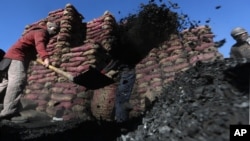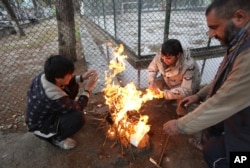As winter approaches in Afghanistan, the Taliban offensive continues with a much greater intensity than it has previously at this time of year. The ongoing hostilities coupled with deepening economic troubles, unemployment estimated at around 24 percent and governance issues have brought President Ashraf Ghani’s government under mounting opposition and public pressure.
Taliban insurgents continue to stage battlefield assaults on Afghan security forces and temporarily seize territory, particularly in northern Afghanistan where the onset of winter traditionally causes a slowdown in the fighting. Late last week, the Taliban seized control of the remote Yamgan district in northeastern Badakhshan province.
Insurgency expansion
The Islamist insurgency has expanded its activities in northern Afghanistan particularly after it briefly captured the strategically important city of Kunduz in September.
Interior Ministry spokesman Sediq Sediqi said Afghan forces have launched an operation to evict the insurgents, promising “good results” very soon.
He said that the government is determined to evict the insurgents from the Yamgan district and inflict “heavy casualties on the enemy" to deter future Taliban attacks in the north.
Ted Callahan, a Western security expert working in northern Afghanistan, said this year’s Taliban advances, although temporary, have enabled the militants to recruit and move weapons, pressuring Afghan security forces.
“We are seeing things well outside of the seasonal norms even worse than last year, which had been compared to previous years was identified as unusual for the amount of Taliban activity that occurred throughout the winter. So, I think this year, based on the current trends we have seen so far, is supposed to be even more bloody and more violent,” he said.
Interior Ministry spokesman Sediq Sediqi said that security operations are also being planned to flush out insurgents from other areas including the major poppy producing southern Helmand province.
Rising insecurities
Callahan explained the importance for Afghan national and defense forces to reverse the gains the Taliban has made since the start of the spring offensive.
“In some ways that postures the Taliban for a much more robust spring offensive because they are already a lot closer to the provincial capitals and other areas of strategic concern then they were a year ago,” he said.
There have been anti-government demonstrations also against rising incidents of kidnappings for ransom. This has prompted some political opponents to demand President Ashraf Ghani and Chief Executive Abdullah Abdullah resign.
Some lawmakers have even called for convening a traditional Afghan jirga or assembly of prominent elders, scholars and leaders to determine the fate of the government, a demand unlikely to receive foreign backing under the circumstances.
U.S. commander of the NATO-led training and advising Resolute Support mission, General John Campbell, while testifying before a congressional committee last month also warned against attempts to destabilize the Ghani government.
“We understand how important having a national unity government is, and I think the Afghans understand this as well. To think that there are people that don't want the national unity government that are, what I would call spoilers out there trying to disrupt that, I think would be foolish and there are,” Campbell said.
Rising insecurity in Kabul has also prompted foreign diplomatic and military missions as well as aid workers to minimize their vulnerability while moving between secure areas in the capital city.
Speaking in Washington last week, U.S. Special Inspector General for Afghanistan Reconstruction, John Sopko, who frequently travels to the country, confirmed American embassy personnel are not allowed to travel by road, and instead must rely on helicopters.
“When I go to Afghanistan I fly into the international airport. It is 1.5 miles away from the [U.S.] embassy. I cannot drive that 1.5 miles. I must be helicoptered the 1.5 miles and that has been going on since February,” Sopko said.
Sopko said the prevailing concern is that the Afghan government, despite its efforts, cannot protect to the satisfaction of security experts the mile-and-a-half from the airport to the embassy.
In October one of the helicopters crashed while trying to land, killing five coalition personnel, including two Americans and wounding five others.
Sopko said that because of the security concerns, he can see less of Afghanistan than he could three years ago.
The United States has spent $110 billion trying to rebuild Afghanistan over the past decade. Sopko’s institution is assigned to conduct an audit of reconstruction projects.






